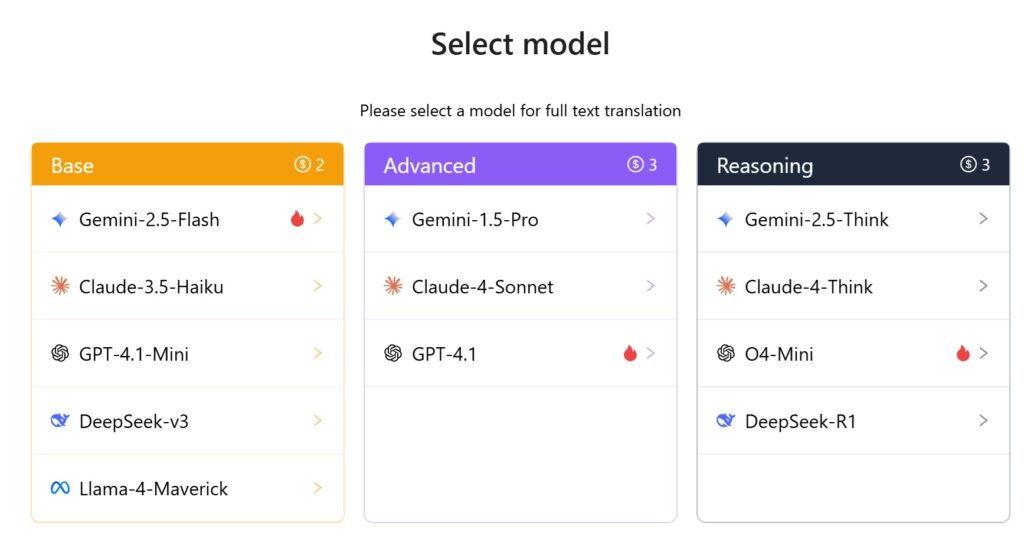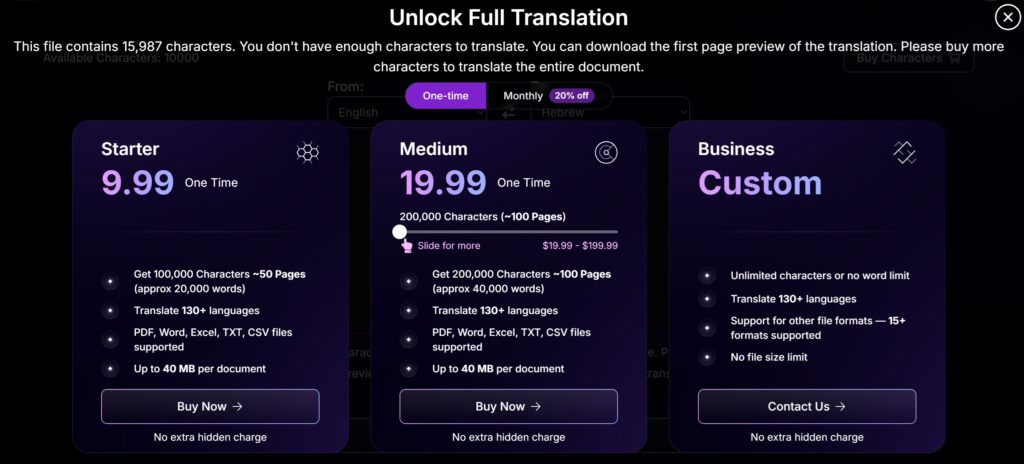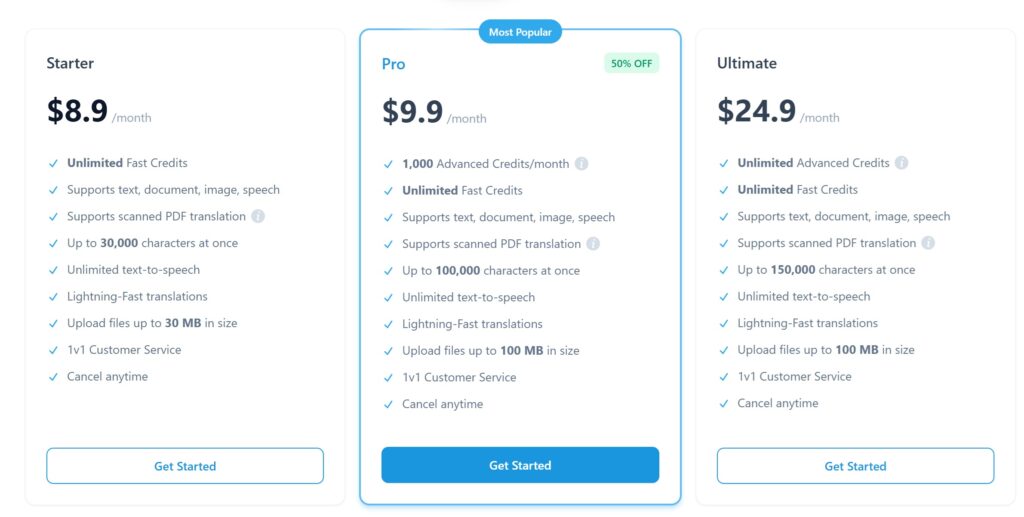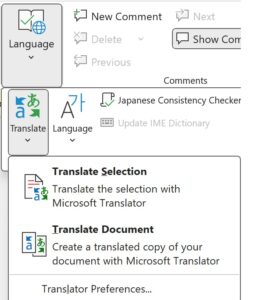Translating Word and PDF documents used to be a tedious, error-prone process — especially when it came to preserving formatting, tables, and layout. But thanks to recent advances in AI, that’s changing rapidly. Today, powerful online apps let you upload a Word or PDF file, select your language pair, and receive a fully translated version that mirrors the original — down to the fonts, spacing, and embedded elements.
Whether you’re a business producing multilingual reports, a law firm working with foreign-language contracts, or a student translating academic papers, AI-powered document translation tools are faster, more affordable, and more accessible than ever before.
In this post, we’ll explore some of the online apps available for AI translation of Word and PDF files in 2025 — what they offer, how they compare, and when it still makes sense to turn to a professional translation service.
1. Doclingo
Doclingo is an AI-powered document translation tool that supports formats like Word, Excel, and especially PDF. It focuses on preserving the original layout—fonts, formatting, and images—while delivering accurate translations across multiple languages.
- Supports DOCX, PDF, XLSX, and other document formats
- Uses AI to preserve original layout (fonts, tables, formatting)
- Translates into dozens of languages
- Offers secure file handling and quick turnaround
- Works directly in browser (no installation) and via Android app
- Freemium model: limited free usage, with paid plans for larger files
- Especially strong in handling PDF to Word translations with layout preservation
- Supports RTL languages

We tested this product on some PDF files and it preserved the format very well, including some quite complex tables. However, the side-by-side editor was not easy to use and worse-it failed to save the edits. A talk with their support may have rectified this.
2. otranslator
You will need to register before trying out otranslator. It is also a freemium product so you will be able to test it on a few sample pages. Here are the highlights.
- Supports DOCX, PDF, EPUB and more.
- Uses multiple LLMs (e.g., GPT‑4.1, Claude‑4) for context‑aware translation.
- Maintains original formatting precisely.
- Pay-per-use pricing (~$1/20k words)
- Supports RTL languages

3 transmonkey
Transmonkey will not let you try it for free and you will need to purchase a subscription to use it. Here are some of the highlights:
- Online Word translator powered by GPT/Claude/Gemini.
- Supports 130+ languages, up to 50 MB files.
- Maintains layout, structure, graphics.
- Does not support RTL languages
4. DocTranslator
DocTranslator is a mess and is not recommended. The interface is loaded up with annoying ads and it seems very difficult to navigate. It is a free app, and you get what you pay for. Here are the main features,
- Free, no registration.
- Translates 109+ languages, preserves layout.
- Uses Google Translate under the hood.
- Instant upload → download workflow.
- RTL language support
5. AI TranslateDocs
AI TranslateDocs requires registration and does not provide much in terms of free samples. 1 page is all they provide. The good thing is that they offer a convenient entry level of $9.99

- Supports DOCX, PDF, XLSX, and PPTX file types
- Translates text into 130+ languages
- Uses GPT-based AI for high-quality output
- Preserves formatting, tables, and layout
- Simple interface: upload → translate → download
In our testing, this app did not deliver good quality results, neither the formatting nor the translation we very good.
6. OpenL Doc Translator
This application appears to be clumsy and not very easy to navigate. The document translation option the home page did not work. But if you click the button Try New button on the home page, it takes you to a new window which enables document and languages selection. You need to enter your email address and then it tells you how much you need to pay.

We ordered a test document from this company and the result was good-the translation was good quality and the page layout was retained to a very high degree. Having said that, the payment process was not smooth and the UI is clumsy.

Features:
- Supports 100+ languages and formats (DOCX, PPTX, XLSX, EPUB).
- Sends translated file by email, keeps formatting intact.
- Supports RTL languages
- Month subscriptions of pay-as-you-go
Comparison of the Various Apps
| Tool | Free / Trial | Formats | Key Strengths |
|---|---|---|---|
| O‑Translator | Paid (~$1/20k words) | DOCX, PDF, EPUB | Multiple LLMs, highly accurate format retention |
| Doc Translator | Free | Any office format | No signup, uses Google Translate, instant |
| OpenL Doc | Paid | DOCX, PPTX, XLSX, EPUB | 100+ languages, email delivery |
| Doctranslate.io | Likely freemium | DOCX, PPTX, PDF | Fast & accurate |
| Taia | Free 5k words/month | DOCX, PDF, PPTX, XLSX | Context-aware, glossary, TM |
| AI TranslateDocs | Free first 10 k chars | DOCX, PDF, XLSX, PPTX | Broad language support |
| Transmonkey | Freemium | DOCX | Supports large files, 130+ languages |
| DeepL | Free + Pro trial | DOCX, PPTX, PDF | Top-tier translation quality |
Other Options
Google Translate offers document translation which is free. The tool does a good job with MS Word files, but not so much for retaining the format of PDF files. DeepL also has a document translation feature. But here we found that the platform was unstable and returned errors for many documents. Once we got it to work, it yielded good results on PDF files and retained the formatting well. ChatGPT can also translate PDF and Word files, but it does not have good support for retaining page layout.
Honorable Mention
Although not an online app, MS Word itself has a very good built-in application for translation of Word files. It typically delivers well-formatted, good quality translations.

Points to Consider
While we haven’t formally tested every tool in a controlled environment, some apps—like DeepL, O‑Translator, and Claude-based platforms—are known in the industry for producing more fluent, context-aware translations. Others, such as DocTranslator, may be faster but less accurate, particularly for technical or structured content.
If you’re uploading sensitive or confidential files, always check the provider’s privacy policy. Some free tools may temporarily store or process files externally, while paid services may offer stricter compliance with GDPR or enterprise-grade encryption.
A Crowded Field
With so many AI translation tools now flooding the market, it may be challenging to choose which one is the best fit for you. On the surface, several of these apps are nearly identical. The reason for this: most of these apps are built on the same foundation — they all call APIs from providers like OpenAI, DeepL, Google, or Anthropic. What differs is the interface, pricing, and a few value-adds. With the AI buzz that has captivated the world, many companies are floating their own application and effectively becoming AI value added resellers. The barrier to entry is relatively low so you can expect to see many other AI-driven apps. It will indeed be challenging for some/many of these resellers to effectively monetize their platform.
Not the Only Option
If you’re tech-savvy or run a translation/localization business, you don’t have to rely on these generic platforms. By using APIs directly — like OpenAI’s GPT-4o or Google’s Gemini — you can build your own translation pipeline:
- Upload a Word or PDF file
- Extract and segment the text
- Translate it via API
- Rebuild the formatted file programmatically
- (Optionally) add glossary support or style prompts
This gives you:
- Lower per-document cost
- Full control over formatting, tone, and workflow
- Integration with translation memory or CAT tools
- A scalable way to handle translation in bulk
For companies and agencies that handle high volumes, skipping the middlemen and building your own solution can lead to huge savings — and better quality.
At GTS, we’ve already built proprietary systems like these to serve our clients. If you’re looking to white-label or integrate AI translation into your own system, we can help with that too.
When Should You Still Choose Professional Translation Services?
AI-powered tools have come a long way—but they’re not a one-size-fits-all solution. For everyday documents or casual use, tools like O‑Translator and DeepL are fast and efficient. But when accuracy, tone, and compliance matter, nothing beats the experience of a trained professional.
Consider hiring a professional translation service if:
- Your documents are legally binding (e.g., contracts, USCIS forms)
- You require certified translations with an affidavit
- The content is technical, medical, or heavily regulated (like SDS or IFUs)
- You need translation memory or glossary consistency across projects
- Cultural nuance, readability, or brand tone is important





